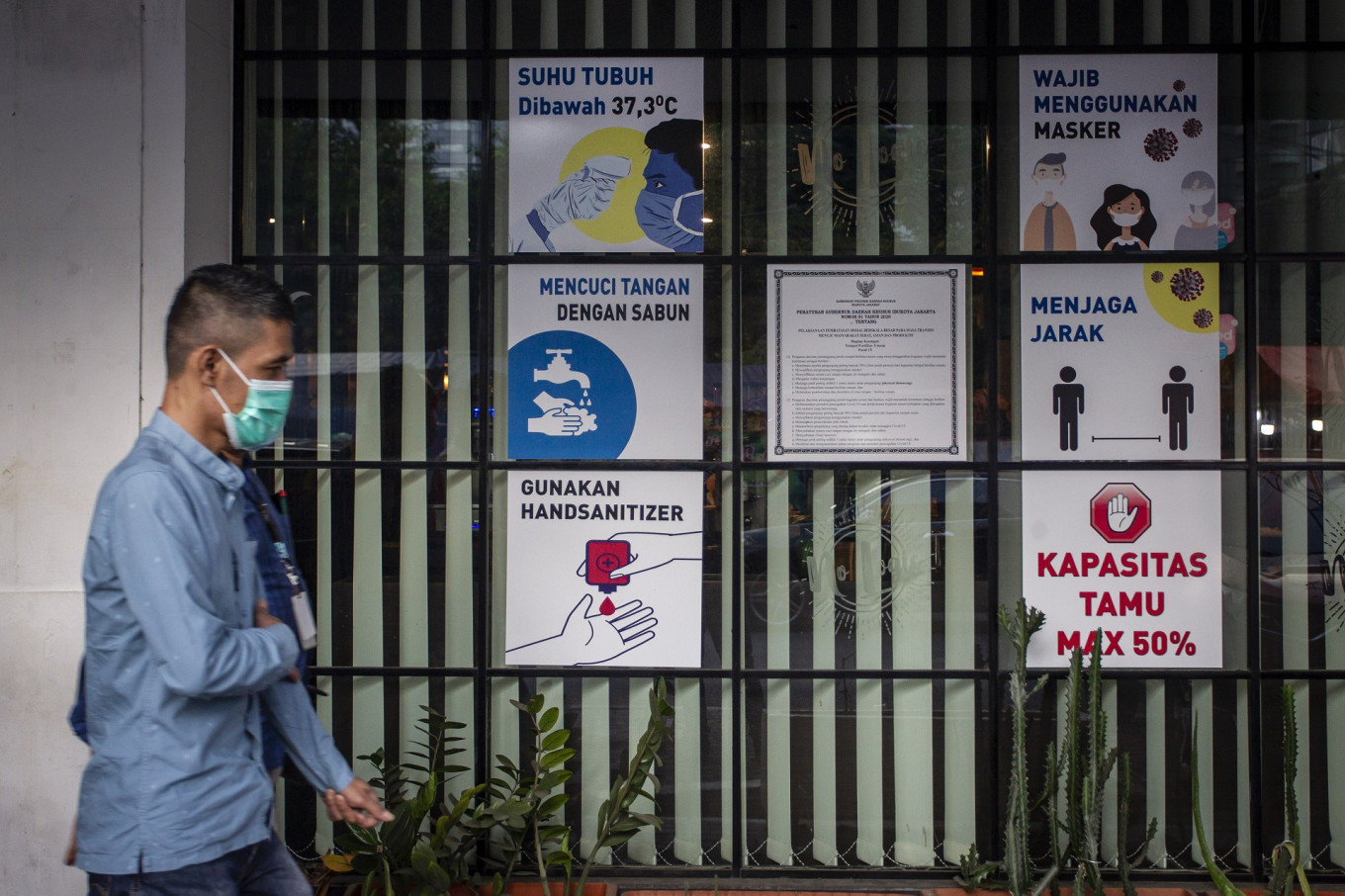Popular Reads
Top Results
Can't find what you're looking for?
View all search resultsPopular Reads
Top Results
Can't find what you're looking for?
View all search resultsGovernment extends curbs as cases near 1 million
Change text size
Gift Premium Articles
to Anyone
T
he government has extended the current period of public activity restrictions (PPKM) for another two weeks in Java and Bali, from Jan. 26 to Feb. 8, as the country’s ever-increasing COVID-19 infection rate is expected to exceed the 1 million-mark in the coming days.
Coordinating Economic Affairs Minister Airlangga Hartarto, who also helms the national COVID-19 and economic recovery committee, told a press briefing on Thursday that only two of the seven provinces imposing the restrictions since Jan. 11 had shown progress in curbing coronavirus transmission.
“Of the seven provinces, five reported an increase [in COVID-19 cases], while Banten and Yogyakarta showed a decline,” Airlangga said, as quoted by kompas.com.
Per the latest extension, the PPKM will remain in effect in 77 regencies and municipalities across Jakarta, West Java, Central Java, East Java, Banten, Yogyakarta and Bali.
The Home Ministry will later issue an official instruction to the seven regional heads regarding the extension, he added.
“Every governor is expected to be able to evaluate based on the parameters of a recovery rate that is below the national average [of 82 percent], mortality rate above the national average, positivity rate above the nationwide average [of 14 percent], and bed occupancy rate above the national average [of 70 percent],” Airlangga said.
Read also: Data problems cast shadow over Indonesia's ambitious vaccine drive
Thursday’s announcement followed Presidential Chief of Staff Moeldoko’s claim on Wednesday that the government would assess the effectiveness of the PPKM ahead of the end of the current period on Jan. 25.
“If, after two weeks, public awareness [of the restrictions] remains low and discipline continues to decline, the next step would be to [evaluate] restrictions,” Moeldoko said.
He went on to say that the process would be similar to previous instances where the government evaluated the effectiveness of the large-scale social restrictions (PSBB) after every two-week period.
As of Thursday, the country had confirmed a total of 951,651 COVID-19 cases and 27,203 deaths linked to the disease.
Of the seven provinces implementing the PPKM, Jakarta has recorded the highest daily COVID-19 increase with 3,151 new cases, followed by Central Java with 1,976 new cases, West Java with 1,228 new cases, and East Java with 1,134 new cases
Under Home Ministerial Instruction No. 1/2021, and later strengthened by a circular from the national COVID-19 task force chief, most of Java and Bali were required to enforce the PPKM from Jan. 11 to 25.
Among other restrictions, the PPKM require 75 percent of employees to work from home and retail stores and restaurants to operate at 25 percent capacity and close at 7 p.m.
The requirements are relatively less stringent than the first PSBB imposed in Jakarta in March and June, which completely prohibited dine-in services and closed all malls, as well as entertainment leisure venues.
Read also: Businesses feel pain of new COVID-19 policy. Economists say it’s necessary
Businesses have previously called in desperation for the easing of the latest COVID-19 restrictions and more government support to help companies survive the pandemic, given that the current stretch of the PPKM coincided with what industry associations considered to be a “crucial sales period”.
The Indonesian Employers Association (Apindo), the Indonesian Shopping Center Association (APPBI), the Indonesian Hotel and Restaurant Association (PHRI) and the Indonesian Commercial Tenants Association (Hippindo) issued a joint statement on Monday detailing their pleas for an easing of restrictions and additional business relief assistance for retailers, restaurants, shopping malls and hotels.
Specific demands include allowing restaurants and retail stores to operate until 9 p.m. at 50 percent dine-in capacity.
In response to the economic downturn, the government allocated Rp 177 trillion (US$12.61 billion) last year in COVID-19 relief funds for private companies, state-owned enterprises and micro, small and medium enterprises (MSMEs). It has allocated an additional Rp 63.84 trillion this year. (rfa)










